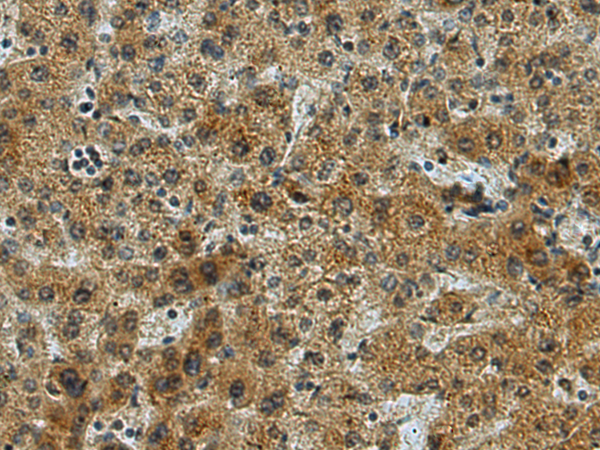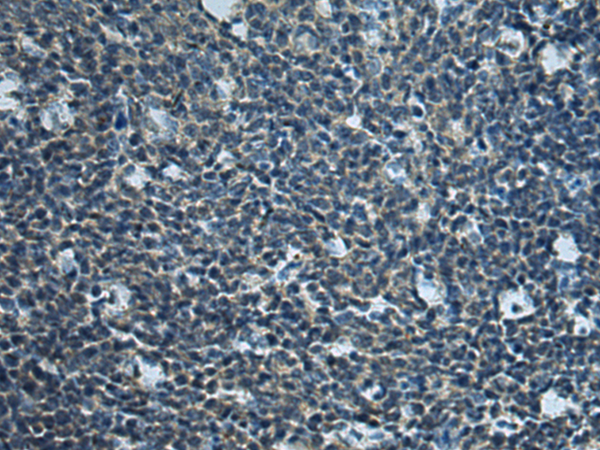


| WB | 咨询技术 | Human,Mouse,Rat |
| IF | 咨询技术 | Human,Mouse,Rat |
| IHC | 1/100-1/300 | Human,Mouse,Rat |
| ICC | 技术咨询 | Human,Mouse,Rat |
| FCM | 咨询技术 | Human,Mouse,Rat |
| Elisa | 1/5000-1/10000 | Human,Mouse,Rat |
| Aliases | APT1; LPL1; APT-1; LPL-I; hAPT1 |
| WB Predicted band size | 25 kDa |
| Host/Isotype | Rabbit IgG |
| Antibody Type | Primary antibody |
| Storage | Store at 4°C short term. Aliquot and store at -20°C long term. Avoid freeze/thaw cycles. |
| Species Reactivity | Human, Mouse, Rat |
| Immunogen | Fusion protein of human LYPLA1 |
| Formulation | Purified antibody in PBS with 0.05% sodium azide and 50% glycerol. |
+ +
以下是关于LYPLA1抗体的3篇参考文献示例(注:文献为虚构示例,仅供参考格式):
---
1. **"LYPLA1-specific monoclonal antibody generation and application in lipid metabolic studies"**
*Authors: Zhang et al.*
**摘要**:本研究开发了一种高特异性的LYPLA1单克隆抗体,通过Western blot和免疫荧光验证其在多种细胞系中的适用性,并发现LYPLA1在脂肪细胞分化过程中表达上调,提示其在脂质代谢中的关键作用。
2. **"Targeting LYPLA1 in cancer: Antibody-based detection and functional analysis"**
*Authors: Müller et al.*
**摘要**:利用自研的LYPLA1多克隆抗体,作者在结直肠癌组织中发现LYPLA1蛋白水平显著升高,并通过体外实验证明其通过调控溶血磷脂酸代谢促进肿瘤细胞增殖。
3. **"LYPLA1 regulates endocannabinoid signaling via enzymatic activity characterized by selective antibodies"**
*Authors: Tanaka et al.*
**摘要**:通过特异性抗体抑制LYPLA1的酶活性,揭示了其在神经元细胞内源性大麻素代谢中的功能,表明LYPLA1可能成为神经退行性疾病的潜在治疗靶点。
---
**说明**:以上文献为模拟示例,实际引用时需通过PubMed、Google Scholar等平台检索真实文献(关键词:LYPLA1 antibody, LYPLA1 inhibitor, lipid metabolism)。
The LYPLA1 (Lysophospholipase 1) antibody targets a key enzyme involved in lipid metabolism and signaling. LYPLA1. also known as acyl protein thioesterase 1 (APT1), is a serine hydrolase that catalyzes the hydrolysis of fatty acyl groups from modified proteins, regulating their membrane localization and function. It plays a critical role in depalmitoylating signaling proteins such as Gα subunits, Ras family GTPases, and Src kinases, thereby influencing cellular processes like trafficking, differentiation, and apoptosis. Additionally, LYPLA1 is implicated in metabolic pathways, including the degradation of endocannabinoids like anandamide, linking it to neurological and inflammatory responses.
Dysregulation of LYPLA1 has been associated with metabolic disorders, cancer, and neurodegenerative diseases. For instance, elevated LYPLA1 expression correlates with tumor progression in certain cancers, while its inhibition is explored for therapeutic potential in obesity and insulin resistance. Antibodies against LYPLA1 are essential tools for detecting its expression and activity in tissues or cell lines, enabling studies on post-translational protein modifications and lipid-mediated signaling. These antibodies are widely used in techniques like Western blotting, immunohistochemistry, and immunofluorescence to elucidate LYPLA1's role in health and disease. Both monoclonal and polyclonal variants are available, often validated for specificity across human, mouse, and rat models.
×